
TELLUS SERIES A-DYNAMIC METEOROLOGY AND OCEANOGRAPHY
Scope & Guideline
Elevating Understanding of Dynamic Earth Systems
Introduction
Aims and Scopes
- Dynamic Meteorology:
Focuses on the study of atmospheric dynamics, including the analysis of weather systems, atmospheric circulation patterns, and their impacts on weather phenomena. - Oceanography and Climate Interaction:
Investigates the interplay between oceanic processes and climate variability, including studies on ocean circulation, heat transfer, and the effects of climate change on marine ecosystems. - Data Assimilation and Numerical Modelling:
Emphasizes the development and application of advanced numerical models for weather prediction and climate simulations, incorporating various data assimilation techniques. - Machine Learning Applications:
Explores the integration of machine learning techniques in meteorological and oceanographic research, enhancing predictive capabilities and data analysis. - Phytoplankton Dynamics:
Examines the ecological impacts of phytoplankton blooms in relation to climate events, particularly in oceanic contexts influenced by atmospheric phenomena.
Trending and Emerging
- Machine Learning in Meteorology:
There is a notable increase in the application of machine learning techniques for weather prediction and data analysis, highlighting the growing importance of artificial intelligence in dynamic meteorology. - Impact of Climate Change on Extreme Weather:
Research focusing on the implications of climate change for extreme weather events has gained traction, reflecting a global concern for understanding and mitigating climate-related risks. - Phytoplankton and Oceanic Feedbacks:
Studies investigating the role of phytoplankton blooms in climate dynamics are on the rise, emphasizing their significance in marine ecosystems and their interactions with atmospheric phenomena. - Advanced Data Assimilation Techniques:
There is an emerging focus on sophisticated data assimilation methods, such as ensemble Kalman filtering and hybrid approaches, which enhance the accuracy of weather and climate models. - Regional Climate Variability Studies:
An increasing number of studies are concentrating on regional climate variability and its impacts, indicating a shift towards localized research that addresses specific climate challenges.
Declining or Waning
- Traditional Statistical Methods:
The reliance on traditional statistical approaches for climate analysis and forecasting appears to be diminishing, with a shift towards more sophisticated machine learning and computational techniques. - General Climate Models:
Interest in broad, generalized climate models may be waning as researchers increasingly focus on high-resolution, region-specific models that can capture local variability more effectively. - Historical Climate Studies:
There seems to be a reduction in studies focused solely on historical climate data analysis, as contemporary issues and predictive modeling take precedence.
Similar Journals
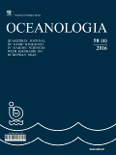
OCEANOLOGIA
Unveiling the Mysteries of the Deep BlueOCEANOLOGIA, a distinguished academic journal published by the Polish Academy of Sciences, Institute of Oceanology, serves as a pivotal platform for researchers and professionals in the fields of Aquatic Science, Oceanography, and Ocean Engineering. Established in 1973 and transitioning to Open Access in 2011, this peer-reviewed journal promotes the dissemination of high-quality research across its diverse scope of ocean-related topics, aligning with its commitment to advancing marine science. With a notable impact factor underscored by its positioning in the Q1 and Q2 quartiles of recognized categories, OCEANOLOGIA stands out with impressive Scopus Rankings, including 49/247 in Aquatic Science and 24/105 in Ocean Engineering, reflecting its significance in the global research landscape. The journal's dedication to publishing cutting-edge studies ensures that it continues to influence both academic discourse and practical applications in ocean-related fields, making it an essential resource for students, researchers, and professionals aiming to contribute to the advancement of oceanic studies.

Weather and Climate
Illuminating Insights on Meteorological TrendsWeather and Climate is a prestigious, peer-reviewed journal published by the Meteorological Society of New Zealand, dedicated to advancing knowledge in the domains of meteorology and climatology. With the ISSN 0111-5499, the journal serves as a vital platform for researchers and professionals to disseminate impactful findings that address pressing issues related to weather patterns and climate change. Although it does not operate on an open-access model, it provides a wealth of valuable insights drawn from a diverse range of studies. The significance of this journal in the scientific community is underscored by its commitment to fostering interdisciplinary collaboration and sharing innovative research that can inform policy-making and environmental management strategies. Located in Wellington, New Zealand, Weather and Climate not only contributes to regional meteorological discourse but also holds relevance for the global scientific landscape, making it essential reading for anyone invested in the future of our changing climate.
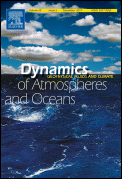
DYNAMICS OF ATMOSPHERES AND OCEANS
Fostering Innovation in Atmospheric and Oceanic SciencesDYNAMICS OF ATMOSPHERES AND OCEANS, published by Elsevier, is a renowned journal that has established itself as a vital resource in the fields of atmospheric science, oceanography, and geology. With a rich publication history stretching from 1976 to 2024, this journal provides a platform for high-quality research that addresses the complex interactions between the atmosphere and oceans, which are critical to understanding climate change and environmental systems. It enjoys a respectable impact factor and a reputable position within its category quartiles, specifically noted as Q2 in critical domains such as Computers in Earth Sciences and Oceanography. Researchers and professionals benefit from its indexed coverage, featuring a Scopus ranking that places it among the leading journals in its categories. Although it is not an open-access journal, readers can access its cutting-edge articles through institutional subscriptions or individual purchases. The journal aims to foster cross-disciplinary dialogue and innovation by publishing original research, reviews, and insightful commentary, making it a cornerstone for scholars, students, and practitioners committed to advancing knowledge in the dynamic interplay of Earth's atmospheric and oceanic systems.
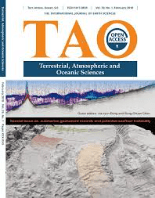
TERRESTRIAL ATMOSPHERIC AND OCEANIC SCIENCES
Championing Open Access for Global Scientific DialogueTERRESTRIAL ATMOSPHERIC AND OCEANIC SCIENCES, published by SpringerNature, is a distinguished peer-reviewed journal that has been an essential platform for innovative research in the fields of atmospheric science, oceanography, and Earth and planetary sciences since its inception. With an Open Access policy established in 1990, the journal ensures wide dissemination of knowledge, allowing researchers, professionals, and students to access cutting-edge findings without restrictions. Based in Switzerland and featuring a comprehensive coverage from 1996 to 2024, the journal currently holds a Q3 ranking across various categories, indicating its growing significance in the scientific community. Although it is positioned within the 39th percentile in Earth and Planetary Sciences, its commitment to fostering high-quality research makes it a valuable resource for advancing understanding of terrestrial environments and their interconnections. Researchers seeking a platform for their work in atmospheric and oceanic sciences will find TERRESTRIAL ATMOSPHERIC AND OCEANIC SCIENCES to be an ideal venue for sharing their insights with a global audience.

Atmospheric Science Letters
Pioneering insights for a sustainable future.Atmospheric Science Letters, published by WILEY, is a leading open-access journal in the field of Atmospheric Science. Since its establishment in 2000, it has significantly contributed to advancing knowledge related to the Earth's atmosphere, focusing on both theoretical and practical aspects. With an impressive Q2 ranking in the Atmosphere Science category as of 2023 and a Scopus rank of 62 out of 148, this journal provides a platform for researchers and professionals to share their findings and insights. The journal’s commitment to open access since 2016 ensures that cutting-edge research is accessible to a global audience, fostering collaboration and innovation in the atmospheric sciences. Addressed from its headquarters at 111 River St, Hoboken, NJ, USA, Atmospheric Science Letters is pivotal for students, researchers, and professionals seeking to stay abreast of the latest developments in this dynamic field.
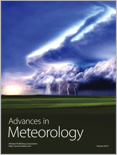
Advances in Meteorology
Bridging Gaps in Atmospheric ResearchAdvances in Meteorology is a renowned open-access journal published by Hindawi Ltd, dedicated to the dynamic field of meteorology and related atmospheric sciences. Since its inception in 2009, this journal has served as a vital platform for researchers and professionals, facilitating the dissemination of cutting-edge research that advances our understanding of atmospheric phenomena. With a commendable impact in the realms of Geophysics, Atmospheric Science, and Environmental Pollution, it boasts impressive Scopus rankings—34th percentile in Geophysics, 54th in Atmospheric Science, and 61st in Environmental Pollution—highlighting its significance and relevance in these critical areas. The journal's commitment to open access ensures that vital research reaches a wide audience, fostering collaboration and innovation within the scientific community. Positioned with a mix of rigorous research and interdisciplinary approaches, Advances in Meteorology continues to shape the landscape of atmospheric science research from its base in Egypt, addressing pressing global challenges related to climate and environment.
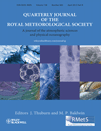
QUARTERLY JOURNAL OF THE ROYAL METEOROLOGICAL SOCIETY
Unveiling insights into the dynamics of our atmosphere.The Quarterly Journal of the Royal Meteorological Society, published by Wiley, stands as a prestigious platform in the field of Atmospheric Science, with a commendable impact reflected in its Q1 quartile ranking and a notable Scopus rank of 4th out of 148, placing it in the 97th percentile among its peers. With origins tracing back to 1873, this journal has established itself as a cornerstone for disseminating high-quality research, engaging articles, and innovative methodologies that advance our understanding of meteorological phenomena. Although it is not an open-access journal, the rigorous peer-review process ensures that only the most significant contributions are published, making it essential reading for researchers, professionals, and students dedicated to atmospheric and planetary sciences. For those interested in cutting-edge findings and comprehensive reviews, the Quarterly Journal of the Royal Meteorological Society is an invaluable resource in enhancing scientific knowledge and collaboration in this dynamic and evolving field.
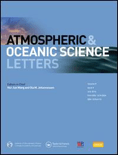
Atmospheric and Oceanic Science Letters
Navigating the Challenges of Climate Change TogetherAtmospheric and Oceanic Science Letters is a premier open-access journal dedicated to the rapidly evolving fields of atmospheric science and oceanography. Published by KEAI PUBLISHING LTD, this journal aims to foster research dissemination and collaboration by providing a platform for high-quality research articles, reviews, and case studies that address critical issues impacting atmospheric and oceanic systems. With an impressive impact factor reflecting its esteemed position—including being ranked Q2 in Atmospheric Science and Q1 in Oceanography in 2023—this journal is an essential resource for researchers, professionals, and students alike. The journal's Open Access model, adopted since 2016, ensures that groundbreaking research is readily available to a global audience, enhancing knowledge transfer and facilitating innovative solutions to environmental challenges. Operating out of the United Kingdom and reaching an international readership, Atmospheric and Oceanic Science Letters plays a pivotal role in shaping our understanding of the interactions between the atmosphere and oceans, making it a vital publication for anyone aiming to stay at the forefront of these dynamic scientific fields.

ADVANCES IN ATMOSPHERIC SCIENCES
Fostering Innovation in Meteorological StudiesADVANCES IN ATMOSPHERIC SCIENCES is a highly esteemed journal published by SCIENCE PRESS, dedicated to advancing the field of atmospheric sciences. With an impressive impact factor and ranking as Q1 in Atmospheric Science as of 2023, this journal serves as a leading platform for researchers, professionals, and students to disseminate substantial findings and innovative methodologies across various topics within the atmospheric sciences domain. Established in 1984 and continuously publishing through to 2024, it has successfully positioned itself among the top ranks, currently standing at #17 out of 148 in the Scopus category, highlighting its significance in the field with a remarkable 88th percentile. Although it operates under traditional access, the journal provides invaluable insights into climate dynamics, meteorology, and environmental processes that are crucial for both academic and practical applications. Based in Beijing, China, ADVANCES IN ATMOSPHERIC SCIENCES is committed to fostering a global dialogue and collaboration among scholars and industry experts, making it an essential resource for those invested in understanding and addressing contemporary atmospheric challenges.

METEOROLOGY AND ATMOSPHERIC PHYSICS
Advancing the Frontiers of Atmospheric ScienceMETEOROLOGY AND ATMOSPHERIC PHYSICS is a premier journal published by SPRINGER WIEN, dedicated to advancing the study of atmospheric phenomena and weather-related sciences. With an ISSN of 0177-7971 and an E-ISSN of 1436-5065, the journal has established itself as an important contributor in the field, particularly noted for its contributions in atmospheric science, holding a Q3 ranking in the 2023 category quartiles. Covering a wide array of topics from meteorological modeling to the physics of the atmosphere, it serves researchers, professionals, and students alike, facilitating the dissemination of significant findings and innovative research. The journal’s acceptance of articles until 2024 encourages a continuous influx of knowledge, and despite its lack of Open Access, it plays a crucial role in enriching the academic landscape for those engaged in Earth and planetary sciences, holding a commendable rank of 78 out of 148 in Scopus. Located in the scenic city of Vienna, Austria, the journal is positioned to harness the vibrancy of the academic community, providing a platform for valuable insights that can drive forward the field of meteorology and atmospheric physics.